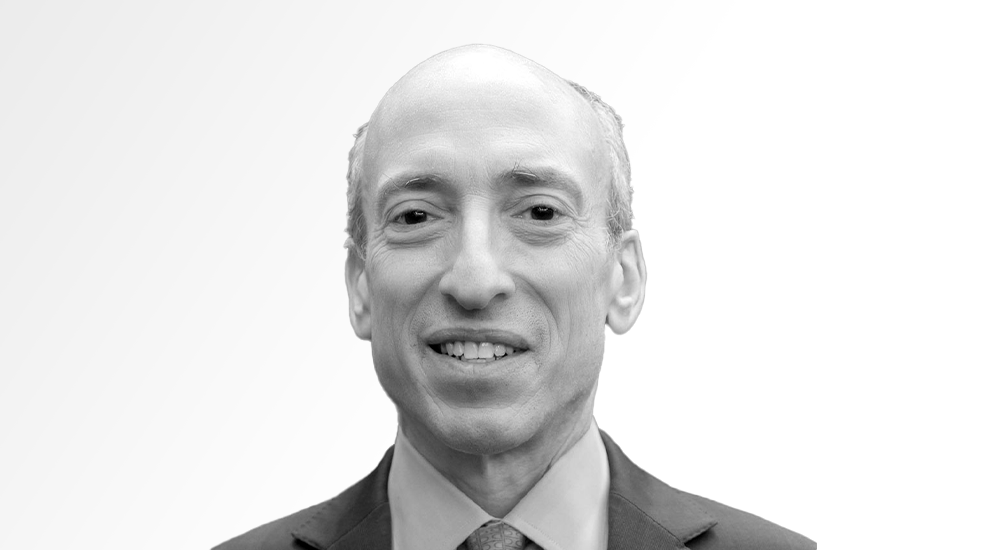Hopes for a bitcoin ETF in the US grew following a widely watched speech by the Securities and Exchange Commission (SEC) chair Gary Gensler on Tuesday, but the optimism was tempered by his forceful remarks on the need for more regulation in the crypto space.
As it pertains to ETF investors, the most notable comments to come from Gensler (pictured) had to do with the potential for a US-listed cryptocurrency ETF.
Gensler acknowledged that cryptocurrency investment vehicles already exist in the form of the $22bn Grayscale Bitcoin Trust (GBTC), the newly launched Bitcoin Strategy ProFund (BTCFX) and others. But he also seemed to understand the strong desire for crypto ETFs, which have many advantages over existing products.
Bitcoin futures ETF favoured
“I anticipate that there will be filings with regard to ETFs under the Investment Company Act (’40 Act),” Gensler said. “When combined with the other federal securities laws, the ’40 Act provides significant investor protections.”
“Given these important protections, I look forward to the staff’s review of such filings, particularly if those are limited to these CME-traded bitcoin futures.”
The comments suggest that Gensler may prefer bitcoin futures-based ETFs over ETFs that would directly own bitcoin. If that is the case, we may see a flood of new filings enter the pipeline soon. Currently, out of the dozen outstanding bitcoin ETF filings, only one is for a futures-based product.
Catalyst for change
While important, Gensler’s comments on crypto ETFs were just a small part of a wide-ranging speech on the crypto industry that he gave at the Aspen Security Forum.
He made it clear he was approaching the space having extensively studied the technology behind blockchains, and that he saw a promising future for it:
“Before starting at the SEC, I had the honour of researching, writing and teaching about the intersection of finance and technology at the Massachusetts Institute of Technology. This included courses on crypto finance, blockchain technology and money.
“In that work, I came to believe that, though there was a lot of hype masquerading as reality in the crypto field, [bitcoin inventor] Nakamoto’s innovation is real,” Gensler added. “Furthermore, it has been and could continue to be a catalyst for change in the fields of finance and money.”
Like ‘the Wild West‘
Though he was optimistic about the potential of crypto, he opined that most crypto assets, including bitcoin, were currently “highly speculative stores of value”.
That, according to Gensler, is completely fine – “good-faith actors have been speculating on the value of gold and silver for thousands of years” – but unlike the market for precious metals, crypto assets live in a world that is “more like the Wild West”, with fraud, scams, abuse, hype and spin widespread in the asset class.
There just is not enough investor protection in crypto, he emphasised.
Gensler was particularly interested in regulating the many crypto tokens he considers to be securities, but that is living outside of the established regulatory regime.
Vulnerable to price manipulation
“I believe we have a crypto market now where many tokens may be unregistered securities, without required disclosures or market oversight. This leaves prices open to manipulation. This leaves investors vulnerable,” the SEC chair explained.
Gensler included stablecoins – crypto tokens pegged to the value of fiat currencies like the dollar – in this potential securities bucket. Stablecoins are among the most widely traded crypto assets, he said, but without proper oversight, they may enable money laundering, tax evasion and the avoidance of sanctions.
Gensler also took aim at decentralised finance (DeFi) platforms that facilitate intermediary-less financial services like the borrowing, lending and trading of crypto assets. If these platforms deal with assets that are considered securities, they have to register with the SEC unless they meet an exemption, he said.
There has been much debate about whether DeFi platforms can be effectively regulated, since they are autonomous protocols that are not operated by any specific entity, but Gensler seems to think that they can be.
More regulatory powers needed
While Gensler was largely optimistic about the SEC’s ability to bring the crypto industry into the regulatory fold, he did note that he believes there are some regulatory gaps that need to be filled by Congress:
“We need additional congressional authorities to prevent transactions, products and platforms from falling between regulatory cracks. We also need more resources to protect investors in this growing and volatile sector.
“Right now, large parts of the field of crypto are sitting astride of – not operating within – regulatory frameworks that protect investors and consumers, guard against illicit activity, ensure for financial stability, and yes, protect national security.
“Standing astride is not a sustainable place to be. For those who want to encourage innovations in crypto, I would like to note that financial innovations throughout history do not long thrive outside of our public policy frameworks.
“At the heart of finance is trust. And at the heart of trust in markets is investor protection. If this field is going to continue or reach any of its potential to be a catalyst for change, we better bring it into public policy frameworks,” Gensler concluded.
This story was originally published on ETF.com



